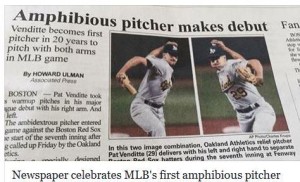 “Texas has a lot of electrical votes.” –Yogi Berra
“Texas has a lot of electrical votes.” –Yogi Berra
A malapropism (or acyrologia) is the use of an incorrect but similar-sounding word in place of the correct word. It was coined from the name of a character, Mrs. Malaprop, who constantly misused and abused her words in the comedy The Rivals by Richard Brinsley Sheridan. In turn, Mrs. Malaprop’s name ultimately descended from the French phrase mal à propos meaning badly placed or inappropriate.
There are two reasons writers (and others) may get their words mixed up. The first, of course, is the similarity of sound. In the quote above, Yogi Berra was actually referring to electoral votes, but electrical is pretty close. Close, but no cigar.
The second reason is that very often words get modified in common usage, especially old words whose original meanings no longer have a relevance for us today, yet the word has evolved into a new usage and often a new spelling. An example of this is tenterhooks.
Many people say (or write), “I’m on tenderhooks,” believing the word refers to the hooks used by butchers to hang meat so it can tenderize. Actually the word goes back much further than that, back to the middle ages when people used mainly woolen or linen cloth. As the cloth was processed and washed, it was stretched on wooden frames, called tenters, to keep it from shrinking as it dried. The hooks on the tenters that were used to hold the cloth in place were, of course, tenterhooks. The colloquial meaning came to allude to the tension of being forcefully tacked and stretched, and has now evolved to mean any kind of suspenseful tension.
Any word, however, can be accidentally twisted into an inappropriate usage. Some examples of malapropisms might include:
After a detailed investigation, the police comprehended two suspects.
I do believe that man is having a nervous shakedown.
King Omar is the exhausted ruler of his rich kingdom.
If you’re smart, you won’t upset the apple tart.
We had great fun riding together on a tantrum bicycle.
Many people have benefited from joining Alcoholics Unanimous.
 There is one place where malapropisms can be used and are not only appropriate but can add to a story, as well: comic relief. Mrs. Malaprop herself added this funny, if painful, dimension to the original story. Shakespeare has used similar characters in several of his plays. In my own satire of romance novels, Love's Savage Armpit, I have one very naïve character who constantly misspeaks, and the results can be quite comical. As with any tool, writers need to know the rules before they break them, but every tool has its exceptions.
There is one place where malapropisms can be used and are not only appropriate but can add to a story, as well: comic relief. Mrs. Malaprop herself added this funny, if painful, dimension to the original story. Shakespeare has used similar characters in several of his plays. In my own satire of romance novels, Love's Savage Armpit, I have one very naïve character who constantly misspeaks, and the results can be quite comical. As with any tool, writers need to know the rules before they break them, but every tool has its exceptions.
So now let’s lay a reef on the grave of accidental malapropisms and make sure we’re using the correct words. Not sure you completely understand the meaning and spelling of a word? Look it up! No matter how many books we’ve written, we’re never too old to learn!
Originally published by Indies Unlimited on June 9, 2015.

No comments:
Post a Comment